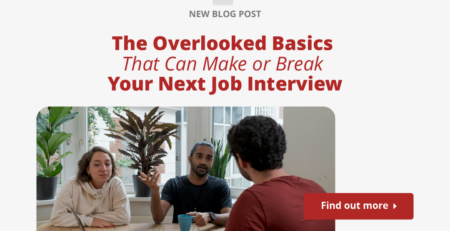Emotions and Decision-Making in the Workplace
Emotional intelligence has been at the forefront of many people’s minds, especially in recent years. Learning more and more about your emotions is said to be the key to good decision-making.
Oftentimes in the workplace, emotions tend to run high in times of upheaval and chaos and thus lead to poor decision-making. On the other hand, however, positive emotions can also cause people to make rash decisions that may or may not turn out to be the best.
Wondering how emotions affect your decision-making in the workplace and beyond? Keep reading to find out more.
How do Emotions Affect Decision Making?
Many experts say that you should keep your emotions out of decision-making for many reasons including the fact that they can often lead to poor decisions. Other experts say that emotions are the most important part of making the right decisions, especially in the workplace.
Whether you are deciding who to hire to fill a position or more intense decisions that may make or break your company, emotions often play a part in the decision. This is because as human beings, emotions are linked to everything you do.
Studies have shown that emotions have a direct impact on decisions that are made either in the workplace or at home. Oftentimes, however, you may not even realize how much your emotions play a part in your decision-making.
According to these studies, those in managerial positions who are experiencing positive emotions, at times, tend to make rash decisions. This can be dependent on the individual but good moods tend to cause people just to decide without thinking things through.
On the other hand, however, those who are in a negative mindset tend to slow their thinking down and focus on the problem at hand. Whether this is due to them realizing that they could easily make a mistake or not, decisions that come from these people tend to be well thought out.
Another scenario in how emotions affect decision-making is when someone is angry they tend to also be extremely rash in their decision-making. Many times these individuals make their decisions based on the ability to get back at another person or the “system”.
The bottom line is that whatever the decision is, there is some level of emotion that plays a part in how it turns out. As humans, the thought process is often ruled by the emotions felt at any particular moment.
What are the Advantages of Emotional Decision Making?
It is important to note that not all decisions that are made out of emotion are bad things. In fact, there are many advantages to emotional decision-making, depending on the particular situation at hand.
Someone who is in the role of employee relations often has to make decisions based on the emotions of other people. This is often seen during conflict resolution situations when the employee relations manager has to decide what to do with employee complaints.
Some research has shown that there are many advantages to emotional decision-making that should not be ignored. Whether the decision involves only yourself or others in the workplace, these advantages deserve a closer look.
The profound connection between emotions and decision-making is a fascinating aspect of human behavior explored in our article on Emotions and Decision Making. As we navigate the intricate landscape of human psychology, it’s crucial to understand the broader context of emotional influence.
Here are some advantages of examples of emotional decision-making:
1. Emotional decisions tend to be made quickly which can be a great advantage in times when there is imminent danger. Quick decisions are also necessary when there is not a great deal of significance to the specific choice.
2. Emotional decisions take away much of the second-guessing and focus on the instincts of the individual making the decision. This is often said to be focused on thinking on your feet rather than taking time to think through all of the scenarios and consequences.
3. Emotional decisions are the best counter to decisions that are based heavily on logical thinking. The reasoning behind this advantage is that you can get bogged down in all of the logic that goes with a decision that sometimes it is advantageous to just make a decision quickly which involves your emotions.
4. Emotional decisions are typically based on the individual’s honesty rather than what other people think. When you want a decision that is focused on a person’s honest opinion, giving them a short amount of time can be a good thing.
5. Emotional decisions can show people how you truly feel about a situation rather than what you think they want to hear. Since emotional decisions are typically done at the moment, it allows people to see what you think about a situation.
While this is not an exhaustive list of advantages of emotional decision-making, it gives you a good start in the thinking behind it. While some emotional decisions can end up great, others may not result in positive results.
Making emotional decisions is not always as bad as many people believe. In fact, they can actually be helpful in certain situations when emotions are the goal of the decision.

What are the Disadvantages of Emotional Decision Making?
While emotional decision-making has many advantages that can result in positive outcomes, you should also consider the disadvantages as well. This is the side of emotional decision-making that can have long-term negative results that cannot be ignored.
Unfortunately, it is the negative side that often gives emotional decision-making a bad name and keeps people from moving forward. Most people have most likely experienced either firsthand or through someone else the consequences of decisions that were made without thinking it through.
Here are some of the disadvantages of emotional decision-making that you may want to consider:
1. An emotional decision gets in the way of rational thinking which then results in a poor decision. At times these decisions are light, however, there are times when these poor decisions can lead to either a loss in business or even worse.
2. When a manager or supervisor uses their emotions to make decisions concerning staff and they end up being poor, everyone suffers. There is often a loss of trust that results from making rash decisions that affect others.
3. Emotional decisions that lead to these poor choices can have a direct impact on the bottom line within an organization. This often happens when a decision is made without thinking through all of the details.
Even though this list of disadvantages is not complete, the ones listed are enough to convince many people keeping their emotions out of decision-making is best. Whether or not you believe this to be true, it is important to keep both the advantages and disadvantages in mind when making decisions.
Are Emotions Necessary to Effectively Make Good Decisions?
Understanding how emotions affect decision-making can help people know why certain ones turn out the way they do. While some experts say that emotions and feelings have no place when it comes to making decisions, especially in the workplace, others believe that they are vital.
Some studies show that emotions and decision-making are an inevitable part of each other and you cannot have one without the other. In fact, some scientific studies have proven that decisions that are made out of emotions are some of the best ones that have existed.
These same studies have shown that emotions are not enough to create these various decisions that have to be made regularly. You must also include the rational side of your brain along with the emotional side to make sound decisions.
Since research shows that not all emotional decision-making is bad, it stands to reason that there are cases that it is in fact valuable. In other cases, there are times when people make a decision based on emotions they feel in the moment and others that are longer-term emotions.
For example, when a person feels grateful that an organization or a person, in particular, has helped them through a specific situation, they may use emotion to make a decision. These types of decisions could be to donate money or other resources to the organization or person that helped them in some way.
The bottom line is that emotions are something that cannot be avoided no matter how hard you try. This means that you will have to learn to take control of your emotions by also using the rational part of your brain to make decisions.
Because of this, it is important to note that keeping your emotions in the forefront of your mind can help you to make effective decisions that can have a lasting positive effect on your business or personal life.
Tips for Using Your Emotions During Decision Making
When it comes to decision-making, there are many factors that you have to consider that come into play. This is because, as a human, you are created to not only act on things but are also equipped with the ability to feel things.
These feelings and emotions tend to have a direct impact on your ability to make decisions based on both rational thinking and emotional thinking. Because of this, decision-making skills are ones that are honed over time by most people in supervisory positions.
Additionally, most people are faced with more decisions throughout the day than you can imagine. These decisions can include anything from what to wear, and what route to take to work, as well as the many decisions that have to be made while you are at work.
Decision-making is considered one of the most important soft skills every good manager should have for a variety of reasons. When a position involves the need to negotiate, good decision-making skills are necessary.
Check out these tips when it comes to making emotional decisions either within the workplace or in your own life:
1. You must take inventory of the emotional intelligence that you bring to the table. How well you can control your emotions in various situations can affect your ability to make rational decisions that result in positive outcomes.
2. Keep in mind that it is okay to take a few minutes or even longer to think about the best decision before diving into one. Pausing a conversation or situation can be beneficial to everyone involved since those few minutes can result in better decisions.
3. Cut yourself some slack if you find yourself in a situation that requires you to make a sudden decision. There are many times in these types of situations that you may fail to make a good decision, and you will need to give yourself some grace.
4. Remember that emotions play a vital role in making decisions that are effective for everyone involved. Paired with rational thoughts, emotional decision-making can lead to positive outcomes.
5. Take the time to think through whether or not you are deciding out of anger, sadness, or extreme happiness. These are the emotions that can lead you to make decisions that have a negative outcome.
6. If you are feeling high emotions, such as anger, try not to make any decisions at all since you are not in the right state of mind. Give yourself permission to take a little time before coming up with a decision.
7. When you do use your emotions to make decisions, have confidence in yourself that you made the right decision. This is especially important if you are in a managerial position since it shows your employees that you can be trusted.

Ready to Use Your Emotions to Make Sound Decisions?
Now that you have a better understanding of how emotions and decision-making go hand in hand, you should be ready to put it to the test. The best way you can do that is to consider rethinking your decision-making plan in your organization by instilling more empowerment into your employees.
Many companies today are revamping their business structures to include empowering employees to make more decisions that have to do with daily routines. Doing this allows you the opportunity to reduce some of the pressures on management since they are not having to make every decision constantly.
In today’s competitive market, finding the right creative and marketing expert can be a challenge. But with icreatives, you’re in experienced hands. With 37 years in staffing and a track record of matching more than 10,000 employees to over 1,000 companies worldwide, we know how to connect you with the best. Plus, you only pay if you hire—there’s no risk, only results.
Ready to find your perfect creative or marketing expert? HIRE WITH ICREATIVES today!












